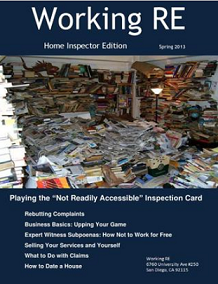 |
>> See Past News Editions >> Follow our NEW Home Inspector RSS Feed >> Click to Print >> Note: If you live in “high-priced” states like AZ, CA, IL, NJ, PA, FL, TX or WA, OREP does not limit coverage or raise your rates. The same rates apply in all states where program is offered. Same day coverage. |
Editor’s Note: Home Inspectors may find interesting what real estate agents and brokers have to say about pre-listing inspections.
How to Talk an Agent into a Pre-Listing Home Inspection
By Natalie Eisen
Real estate agents generally agree that a home inspection is essential for the buyer. But should the seller take the time and money to have their home inspected before a buyer enters the picture? If you’re a home inspector trying to augment or build a business with pre-listing inspections, here is some insight into what agents and brokers think.
Some agents believe that this can be a waste of money for the seller and present risks, while others argue that a pre-listing inspection can be vital to the seller going into a home sale. “It’s usually not in the best interest of the homeowner to do a pre-listing inspection,” says Barbara Todaro, a Massachusetts real estate agent. “I see this function as a benefit to the buyer. All listing agents must think about what is best for the seller and how the seller will benefit. A pre-listing inspection is nothing more than a game of chance for the seller. Agents should be cautious about what they recommend to their potential seller. Your recommendation may cost your seller money they don’t have, and it may cost you the loss of a listing.”
Todaro goes on to explain that full-disclosure laws mean that whatever is in the report must be revealed to potential buyers. She says that there is no way to tell for sure what the buyer is capable or willing to repair and disclosing everything that needs repair is a surefire way to scare off potential buyers.
“In some situations, pre-inspections can cause disputes,” says Toni Weidman, a Realtor from Florida. “Several pre-inspectors have found some things wrong, and the sellers went to the trouble and expense of having those items repaired. They thought that was the end of it. Then along came a buyer who had his own inspector and found several more items. Now, of course, the buyer wants them fixed. The seller is saying no, he’s not paying for any more fixes. He had a pre-inspection done, and the repairs were made. He may think the buyer is trying to rip him off.” Weidman says that cases like these are the reason not to complete a pre-listing inspection. “Why not wait to have the inspection done and covered by the contract?” Weidman asks. “Isn’t that what the contract is for?”
(story continues)
Others disagree. “The questions is, why should a seller pay for the expense of a home inspection when any smart buyer is probably going to hire their own inspector anyway?” asks Russell Spornberger, Georgia home inspector. “Preparation is the answer: ‘forewarned is forearmed’.” Spornberger says that having a pre-listing inspection can arm the seller with information they may not have had about their home. Few sellers, he says, will take the time to climb onto the roof or take a look at their electric panel. “By doing a pre-listing inspection,” he says, “a seller can learn the true condition of their home from an objective observer. Using the pre-listing inspection, and without the pressure of a pending sale, the seller working with his or her listing agent can develop a strategy that will ensure the house will be sold quickly and smoothly.”
“A pre-inspection catches what the buyer may find during their own inspection,” says Athina Boukas, broker and Realtor in North Carolina. Boukas is strongly in favor of pre-listing inspections, saying that they have a multitude of advantages: for example, the pre-listing inspection report can be presented to a potential buyer in order to reveal all information about the home immediately and start off with full confidence. “It is less likely that the buyer will renegotiate the offer after their own inspection,” Boukas adds, “because it is less likely they will find a surprise or a new deal breaker.”
Although the decision about whether or not to have a pre-listing inspection ultimately falls to the seller, a pre-listing home inspection can be a vital part of the process.



by Matt Worthy
Great post! Getting an un-biased report of your home’s condition before you list it, gives you a great advantage. A pre-listing inspection identifies potential defects ahead of time, giving you the opportunity and time to make repairs that would have certainly been called out by your buyer’s inspector. To know more about pre-listing inspection, you may wish to visit: https://www.worthyinspections.com/pre-listing-inspection
-by Daniel Sanni
The solution to the buyer not trusting the prelisting inspection is the seller getting an inspection from a third party vendor like preofferinspection.com
-by Nicholas Lorber
Roger, this is the key “critical to hire the most thorough inspector around for the prelisting inspection”. Many parties to a real estate transaction look at home inspector/inspections like a commodity (doesn’t matter if you get the cheapest one since they are all the same value). It couldn’t be farther from the truth. Do it “big” or not at all. Thanks, for your comments. ~ Nick @ Lorber Engineers, San Diego
-by Aaron Miller
In a sellers’ market such as we have today, pre-listing inspections are a near complete waste of money for sellers. In Texas, sellers are required to disclose any inspection reports to future prospective buyers for 5 years. How is this not doing the buyer’s job for him/her? After all, the saying goes “caveat emptor” and not “caveat vendor”. This is the 21st century. Pre-listing inspections have, or should have, gone the way of open houses, fax machines, and articles that merely perpetuate common misbeliefs and practices.
-by Roger Kautz
Two thoughts about prelisting inspections: I suggest to homeowners that if they would not or could not respond to issues identified in the report – either by correcting them or perhaps having an electrican or engineer, for example, confirm that the issue is not really an issue; then the prelisting inspection may not be for them. As far as I know, those who use a thorough inspector for the prelisting inspection sail right through the subsequent buyer’s inspection .
-Second, it is critical to hire the most thorough inspector around for the prelisting inspection, to avoid the number one complaint about prelisting inspections – that they won’t identify everything. There are inspectors in Wisconsin who offer to do what they call “walk-throughs”, which they claim are not technically inspections, which focus on “big ticket” items, and which do not involve a written report. I think those are very risky for the inspector and the seller, and are likely to leave everyone unsatisfied. My prelisting inspections are every bit as thorough as my other ones, and so far no one has ever come back to me with a complaint that I missed something.
by Charles Weber
Roger, I believe your on the right track. A sellers inspection should be nothing like the buyers inspection. By discovering, and addressing, any serious issues ahead of time will avoid having to deal with them at a time in the transaction when things are time sensitive and everyone is very emotional. As you know, my foundation inspections almost always took place after the buyers inspection. Over the last few years I’ve had a steady rise in the number of foundation inspections I’ve performed for sellers, prior to listing their home. There is no comparison between the two. Sadly, almost every opinion I’ve listened to from Home Inspectors it seems their only concern about pre-listing inspections is how they will be impacted. If Home Inspectors would observe the position they are putting the buyers and sellers in, by having to address a major concern such as a foundation, at this point in a transaction, they would see how selfish they are being.
-Time does not permit me to be specific about my observations. What I will say is if your a Realtor or Home Inspector and want to do what’s best for your clients you’d find a way to make this work.
by Jon Bolton, the INSPECTAGATOR
As a professional inspector myself, I would warn a buyer on doing a pre-listing inspection with the wrong inspector! Since 1998, I have seen inexperienced or incompetent inspectors miss far too many items. Pre-inspect your inspector!
-